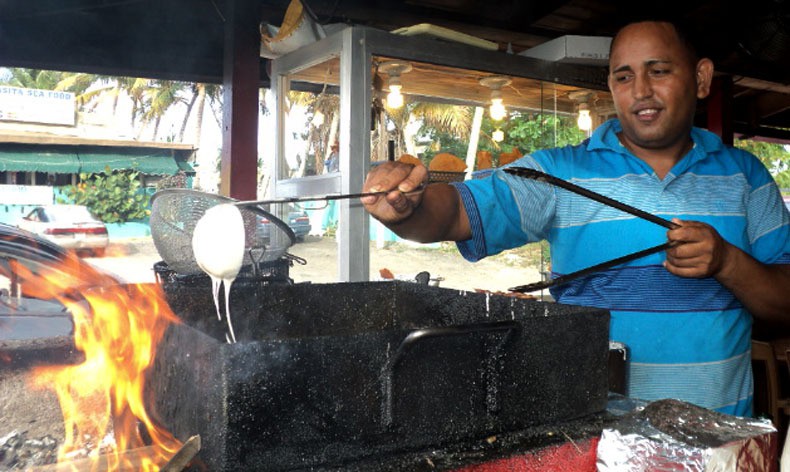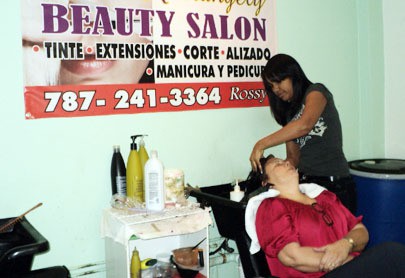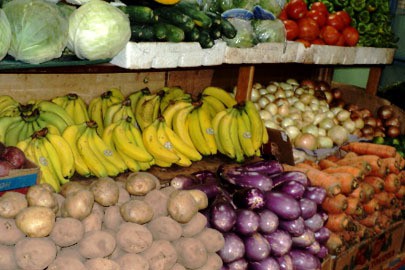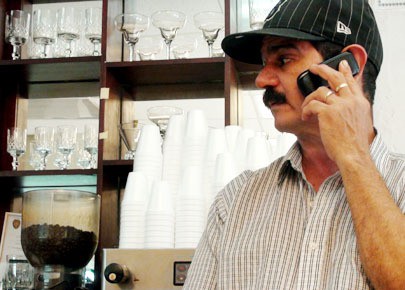Dominican Immigrants in Puerto Rico Find Success As Business Owners

By Khara Persad
Cronkite Boderlands Initiative
SANTURCE, Puerto Rico -- Seven years ago, Rossy Santos made a perilous 80-mile journey from the Dominican Republic to Puerto Rico in a rickety boat filled with 26 other Dominicans, surviving on bottled water, cheese and crackers. She left her 16-year-old daughter, Melissa, and most of her family behind.

Rossy Santos, 38, takes care of a customer at her beauty salon “Kiarangely” located in Santurce. She came to Puerto Rico in a yola at the age of 31, leaving her then 12-year-old daughter, Melissa, behind. Photo by Khara Persad |
"Mejor vida," she said simply when asked why she chose to illegally migrate at the age of 31. The better life she sought was not only for her, she said, but most importantly for her family back in the Dominican Republic.
Her story is somewhat typical. Most undocumented immigrants who illegally sneak into a country come in search of more opportunities for themselves and their relatives. They usually find informal, low-skilled jobs. But Rossy is one of a strong community of Dominicans in Puerto Rico who has defied expectations. She is not a maid. She is no longer undocumented. And she owns a business.
Ranging from colmados -- small grocery stores -- to remittance agencies to hair salons and cafes, Dominican-owned and operated businesses have claimed an unmistakable and perhaps indelible spot in the Puerto Rican landscape. Neighborhoods in Rio Piedras, Santurce and metro San Juan are brimming with these businesses.
There are no official numbers on how many Dominican-owned businesses there are or how much they contribute to the Puerto Rican economy. But businesses large and small in Puerto Rico accounted for $2.7 billion in earnings in 2010, according to the U.S. Bureau of Labor Statistics.
Rossy has owned her business, a beauty salon called "Kiarangely" in Santurce, for the past two years.
"I feel like I made it," she says.
Every fortnight, she sends money home to the Dominican Republic to help support her mother, father, brother, and now 23-year-old daughter, who is a university student.
Immigrants 'Not Picky' About Work Opportunities
Dominican immigrants to Puerto Rico, who risk their lives crossing the Mona Passage in small hand-made boats called yolas, usually aren't too picky about how they will make a living.
Rossy's brother picked her up in the coastal city of Rincon. They moved into a rentend house and she spent her first two months in Puerto Rico without a job. She was eventually hired to work in a beauty parlor. Five years later, after saving as much as she could, Rossy took a loan from her brother to purchase the space that is now occupied by Kiarangely.
Juan Ciprian Parra, a 50-year-old former native of Santo Domingo, who has been living in Puerto Rico for 24 years and works at Dollar Family in Rio Piedras, said Dominicans are strong people, and always do what they have to do to survive.
"If the Dominican has to work in construction or security, we will work in that; we don't care the type of job that it is, we always try to earn our money," said Ciprian.
The 2010 U.S. Census Bureau estimated the number of Dominicans living in Puerto Rico at 80,000. But Máximo Taveras, the Dominican consulate general in Puerto Rico estimated the number as closer to 200,000, with around 60 percent being undocumented.
"It's only a projection, there's no numbers that can support that," he explained.
Most Dominicans start off as laborers when they move to the island, cleaning houses, finding work in the construction industry, taking the jobs no one else wants. But increasingly, they are breaking away from that tradition and are trying to build their own businesses as small-scale entrepreneurs. Some go through the legal process of obtaining permits. But others move forward regardless of regulations and the law.
Carlos Chardon, the former regional director of the Small Business Administration in Puerto Rico and now assistant secretary of state for governmental affairs, estimated that at least one in four of all small businesses in Puerto Rico are illegal, meaning they lack permits to even open a business. But he isn't critical of the entrepreneurial efforts.
"Let's thank God for that illegal activity, which keeps the economy going," says Chardon.
He says Dominican-owned businesses are a growing group and a very important one for the Puerto Rican economy, which can use all the help it can get.
Puerto Rico's unemployment rate, according to the U.S. Department of Labor is 15 percent. The U.S. Census Bureau reported that 45 percent of the population in 2010 was below the poverty line.
Luis Torres, an 80-year-old Puerto Rican who owns Ferretería Lopez Discount, describes Dominican businesses in Plaza del Mercado in Rio Piedras as incredibly successful. He admires the Dominicans' drive, and is not threatened by their presence and market share in the small-business industry.
"They are good people," Torres said, "they work very hard and we welcome them."
Small Dominican Businesses Receive Aid, Face Hurdles
The Plaza del Mercado is an open-air market, filled with Dominican men and women selling fruits, vegetables, various types of salted meat, and other canned foods from stalls.
The popular shopping area has a sense of community and togetherness, as business owners and workers wander away from their stalls to chat with each other in small groups.
Many of them end up at Barberia El Figaro, a barber shop and informal meeting place.
"It is a tight community, united," says Robert Mercedes Rodríguez, 52, a worker at the barbershop.
Mercedes came to Puerto Rico over 30 years ago after his parents arranged a legal migration. El Figaro is owned by Mercedes' brother, who has operated the shop for almost 15 years.
The shop needed health and fire department permits before it could open, which Mercedes described as a difficult process. But it could have been worse if he were an illegal immigrant.
"The process to open business is not easy," he says. "I think being Dominican makes it harder, but we can still do it because we are legal."
The U.S. Department of Labor and the Small Business Administration do not have "nationality" as part of their checklist for assisting employers or future business owners, but business owners must be in the country legally.
"Our loans are open to everyone," says Samuel Maldonado of the SBA. "If you are not a U.S. citizen, there is a specific form from immigration that will determine the status of person and whether he can do business or not."
The U.S. Citizenship and Immigration Services requires non-citizens to fill out a G-845 Document Verification Request, which will determine whether applicant is a lawful permanent resident, conditional resident alien, authorized or unauthorized for alien employment. Based on this status assessment by the USCIS, the SBA moves forward with loans.

Frutas y Algo Más is owned by Pedro Lopez, a Dominican who has lived in Puerto Rico for 18 years. Every month, Lopez sends money back to his family. Photo by Khara Persad |
Frutas y Algo Más is a tiny fruit and vegetable stall a few steps past the barbershop. It is owned by Pedro Lopez who described the lengthy process he faced.
"It's about 14 agencies you have to go to, pay employer's insurance, the municipality, health, fire and they require so much documentation," he says.
Lopez, 52, has lived in Puerto Rico for 18 years. He never dreamed of opening his own business; all he hoped for was steady employment and enough money to send back home.
He started working as a gas station attendant and worked in various jobs over the years. After saving money, Lopez was able to get a spot in the popular plaza only two years ago, right next to the University of Puerto Rico on Ponce de Leon Street in Rio Piedras, just outside San Juan.
His tiny stall is surrounded by others similar to his, with colorful pumpkins, eggplants, carrots and tomatoes laid out, and bright yellow bananas hanging from hooks for customers to see for themselves. Like many other Dominicans you meet, Lopez is shy yet courteous, and is hesitant to talk about his past even though he is in Puerto Rico legally.
Lopez sends money to his family every month via La Nacional, one of the biggest remittance agencies in the country, and he is in the process of bringing them to Puerto Rico, where they intend to live permanently.
It may have taken almost two decades to get to where he is now, but Lopez is more than satisfied with the life he has made after years of hard work.
"Claro que si!" he exclaimed when asked if he was happy, which in English means, "Of course."
A Booming Informal Sector
Taveras, the Dominican consulate general in Puerto Rico, explained that such businesses are booming because of the nature of Dominicans, who he described as business savvy entrepreneurs who do not often seek assistance from the consulate.
"There's a booming especially in the informal sector, as well as restaurants and cafeterias and these type of businesses," Taveras says.
Chardon, on the other hand, said that because so many Dominican business owners do not go through the proper process their ability to survive during harder economic times is heightened. "If they (businesses) were held down by government, they would have been killed," he said, explaining why small businesses are able to survive during a recession.
As Chardon indicated by his rough estimate, not all of these businesses operate under the radar. Like Lopez and Rossy, there are Dominican business owners within Rio Piedras, Santurce and San Juan who have worked toward getting their permits, as well as Dominicans workers who are following in their bosses' footsteps to open businesses of their own.
Algerí, 27, has operated a mobile snow cone cart on the streets of Old San Juan for one year now, but it does not belong to him. He receives a weekly commission from the owner, and sends what money he can every 15 days to his daughter back in the Dominican Republic.
Even though he is legal, Algerí says he is working hard to save money so he can open his own business when he eventually returns home.
Kénia Padilla, who has worked as a cook for two months at a small-scale, beachside restaurant called Guavate En in Piñones, responded with a shake of her head, a sigh and a laugh, when asked if she missed her homeland. After a pause, her face softened and she replied simply, "I miss the people. My people."
Padilla went on to explain that she couldn't miss a place that had so many deficiencies and problems and few opportunities. But she made sure to make a distinction between the island in which she was born, and the people surrounding her.
The 32-year-old Padilla is loud, comical and had a clever response for every question. When asked why she moved to Puerto Rico, Padilla explained, with a coy smile, that she fell in love and came with her husband.
To the question of how she travelled here, Padilla shook her head resolutely.
"Not a good question," she said.
When Padilla arrived in 2003 she got a job as a housekeeper and eventually got her papers. She sends money to her family every three weeks. But she never plans to return.
Now she is only interested in one type of migration, from employee to employer.
"My own business," she said simply, "in food."
The small restaurant business is indeed booming for Dominicans, as they specialize in Dominican dishes like mangu and mofongo, which you can find on the menu of almost any small café or restaurant.
A Network of Dominican Owners and Employees
Brasa B.B.Q. sits on the corner of Avenida Juan Ponce de Leon and Avenida Coll y Toste, sandwiched between a Kentucky Fried Chicken and a Walgreens Pharmacy. Irma de la Rosa is at the front, taking orders and counting changein this Dominican-owned restaurant.
The owner is not there, but all the waiters and cooks are Dominican and seem to know every customer who walks into the restaurant. They exchange warm greetings and engage in small talk. At 1:20 p.m. on a Friday, there are close to 30 customers either lined up or seated and enjoying their lunch.
Similar to Piñones on the northeastern side of the island, many of these Dominican-owned businesses are alike; Dominican owners hire Dominican employees.

Alejandro Gomez opened Center Café in Rio Piedras two years ago. He has since given ownership to his son, Alex. Photo by Khara Persad |
They hire and look out for their own. Even if they are not related by blood they are related by common goals and aspirations.
"We always have a connection," said Girmania Elizabeth Matrille, a 28-year-old Dominican who has been living in Puerto Rico since the age of 12.
Elizabeth is a student at Sacred Heart University in Puerto Rico, now working on her final thesis about Dominicans living on the island.
"Nacionalismo," she said, trying to describe the reason for this unspoken connection. She is proud of the hard-earned success her people have found in Puerto Rico.
That success is exemplified by Alejandro Gomez who moved to Puerto Rico in 1986, and after years of struggle and a failed business, opened a little restaurant, Centro Café in 2011. He now has passed it on to his son, Alex.
"Empieza de abajo y se va superando," says Gomez. -- "You just got to start from the bottom and work your way up."
Back to Top
